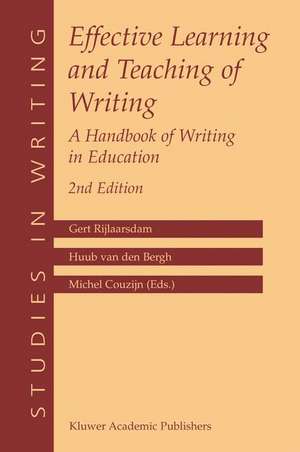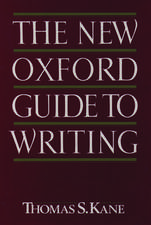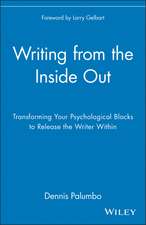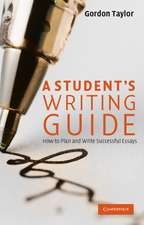Effective Learning and Teaching of Writing: A Handbook of Writing in Education: Studies in Writing, cartea 14
Editat de Gert Rijlaarsdam, Huub Bergh, Michel Couzijnen Limba Engleză Hardback – 18 oct 2004
This new volume in the series Studies in Writing brings together researchers from all kinds of disciplines involved in writing research and countries in their endeavour to improve the teaching of written composition. It is the result of co-operation of researchers all over the world and shows that in spite of the differences in educational regions over the world, research in writing shares similar problems, and tries to find answers, and generate new questions. The body of knowledge in this volume will inspire researchers and teachers to improve research and practice.
| Toate formatele și edițiile | Preț | Express |
|---|---|---|
| Paperback (1) | 2108.27 lei 6-8 săpt. | |
| SPRINGER NETHERLANDS – 18 oct 2004 | 2108.27 lei 6-8 săpt. | |
| Hardback (1) | 1834.86 lei 6-8 săpt. | |
| SPRINGER NETHERLANDS – 18 oct 2004 | 1834.86 lei 6-8 săpt. |
Din seria Studies in Writing
- 15%
 Preț: 640.88 lei
Preț: 640.88 lei - 15%
 Preț: 646.94 lei
Preț: 646.94 lei - 15%
 Preț: 639.41 lei
Preț: 639.41 lei - 18%
 Preț: 948.47 lei
Preț: 948.47 lei -
 Preț: 388.13 lei
Preț: 388.13 lei - 15%
 Preț: 646.30 lei
Preț: 646.30 lei - 26%
 Preț: 618.30 lei
Preț: 618.30 lei - 15%
 Preț: 637.13 lei
Preț: 637.13 lei - 5%
 Preț: 718.10 lei
Preț: 718.10 lei - 15%
 Preț: 646.11 lei
Preț: 646.11 lei - 18%
 Preț: 691.28 lei
Preț: 691.28 lei - 18%
 Preț: 607.41 lei
Preț: 607.41 lei - 18%
 Preț: 742.05 lei
Preț: 742.05 lei - 18%
 Preț: 573.06 lei
Preț: 573.06 lei - 18%
 Preț: 720.36 lei
Preț: 720.36 lei - 18%
 Preț: 779.02 lei
Preț: 779.02 lei - 18%
 Preț: 576.05 lei
Preț: 576.05 lei - 18%
 Preț: 677.65 lei
Preț: 677.65 lei - 18%
 Preț: 763.63 lei
Preț: 763.63 lei - 18%
 Preț: 616.39 lei
Preț: 616.39 lei - 18%
 Preț: 696.94 lei
Preț: 696.94 lei - 18%
 Preț: 570.92 lei
Preț: 570.92 lei - 18%
 Preț: 548.72 lei
Preț: 548.72 lei - 18%
 Preț: 577.99 lei
Preț: 577.99 lei - 18%
 Preț: 703.53 lei
Preț: 703.53 lei - 18%
 Preț: 522.06 lei
Preț: 522.06 lei
Preț: 1834.86 lei
Preț vechi: 2237.64 lei
-18% Nou
Puncte Express: 2752
Preț estimativ în valută:
351.09€ • 366.57$ • 290.58£
351.09€ • 366.57$ • 290.58£
Carte tipărită la comandă
Livrare economică 05-19 aprilie
Preluare comenzi: 021 569.72.76
Specificații
ISBN-13: 9781402027246
ISBN-10: 1402027249
Pagini: 688
Ilustrații: X, 670 p.
Dimensiuni: 170 x 240 x 35 mm
Greutate: 1.12 kg
Ediția:2nd ed. 2005
Editura: SPRINGER NETHERLANDS
Colecția Springer
Seria Studies in Writing
Locul publicării:Dordrecht, Netherlands
ISBN-10: 1402027249
Pagini: 688
Ilustrații: X, 670 p.
Dimensiuni: 170 x 240 x 35 mm
Greutate: 1.12 kg
Ediția:2nd ed. 2005
Editura: SPRINGER NETHERLANDS
Colecția Springer
Seria Studies in Writing
Locul publicării:Dordrecht, Netherlands
Public țintă
ResearchCuprins
Effective Learning and Teaching of Writing.- Effective Learning and Teaching of Writing.- Studies in Learning to Write.- Emergent Writing in Kindergarten and the Emergence of the Alphabetic Principle.- Looking at Reading and Writing Through Language.- Rewriting to Introduce Punctuation in the Second Grade: A Didactic Approach.- Contextual Factors Enhancing Cognitive and Metacognitive Activity During the Process of Collaborative Writing.- Metacognitive Regulations, Peer Interactions and Revision of Narratives by Sixth-Graders.- The Directivity of Teacher Strategies in Collaborative Writing Tasks.- Making Digital Annotations Using the World Wide Web.- Popular Culture: A Resource for Writing In Secondary English Classrooms.- The Garden of Thought - About Writing Poems in Upper Secondary School.- Using a Structured Writing Workshop to Help Good Readers Who are Poor Writers.- Deaf Ways of Writing Narratives: a Bilingual Approach.- Stylistic Imitation as a Tool in Writing Pedagogy.- Improving Arguentative Writing by Fostering Argumentative Speech.- Monitoring Local Coherence Through Bridging Integration.- Learning to Write Instructive Texts by Reader Observation and Written Feedback.- Learning to Read and Write Argumentative Text by Observation of Peer Learners.- The Uptake of Peer-Based Intervention in The Writing Classroom.- Studies in How to Teach Writing.- Teaching Writing.- Impact of Regular Philosophical Discussion on Argumentative Skills.- Action Research.- Teaching How to Write Argumentative Texts at Primary School.- Teaching Writing — Teaching Oral Presentation.- Writing to Learn: Constructing the Concept of Genre in a Writing Workshop.- Writing “In Your Own Words”: Children’s Use of Information Sources in Research Projects.- Metacognition to Learn How toWrite Texts at School and to Develop Motivation to Do It.- Fostering Novices’ Ability to Write Informative Texts.- Adapting to The Classroom Setting: New Research on Teachers Moving Between Traditional And Computer Classrooms.- Assessment of Argumentative Writing.- Digital Information Literacy: Teaching Students to Use The Internet in Source-Based Writing.- “Down The Plughole”: The Pitfalls of Testing The Writing of L2 Pupils.- Studies in Writing to Learn.- Composing A Summary.- Enhancing Thinking Dispositions Through Informal Writing.- Fostering Reflective Writing by Structuring Writing-To-Learn Tasks.- Reflective Writing & Reflective Thinking.- Writing-To-Learn: Conducting A Process Log.- Learning by Writing Hypertext: A Research Based Design of University Courses in Writing Hypertext.- The Effect of Student Prior Experience, Attitudes, and Approaches on Performance in An Undergraduate Science Writing Program.- Children’s Writing Strategies: Profiles of Writers.- Writing-To-Learn and Graph-Drawing as Aids of The Integration of Text and Graphs.
Textul de pe ultima copertă
Effective Learning and Teaching of Writing is a handbook on research on the effective teaching and learning of writing. It is a reference for researchers and educators in the domain of written composition in education. Effective Learning and Teaching of Writing covers all age ranges and school settings and it deals with various aspects of writing and text types. Research methodology varies from experimental studies to reflective classroom practitioners’ research.
This new volume in the series Studies in Writing brings together researchers from all kinds of disciplines involved in writing research and countries in their endeavour to improve the teaching of written composition. It is the result of co-operation of researchers all over the world and shows that in spite of the differences in educational regions over the world, research in writing shares similar problems, and tries to find answers, and generate new questions. The body of knowledge in this volume will inspire researchers and teachers to improve research and practice.
This new volume in the series Studies in Writing brings together researchers from all kinds of disciplines involved in writing research and countries in their endeavour to improve the teaching of written composition. It is the result of co-operation of researchers all over the world and shows that in spite of the differences in educational regions over the world, research in writing shares similar problems, and tries to find answers, and generate new questions. The body of knowledge in this volume will inspire researchers and teachers to improve research and practice.
Caracteristici
No publications with the same aims and scope available (but there will be published two handbooks this or next year in the US) Benefits:broad scope, all age ranges, all levels of schooling, all kinds of text types, all kinds of educational regions (multi-language approach: all continents are represented







